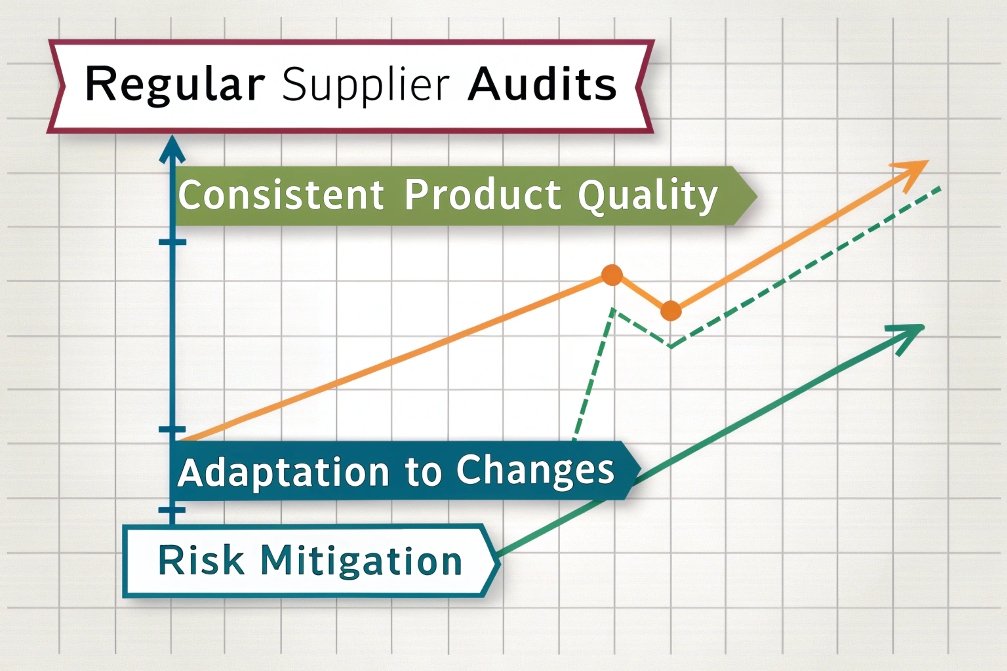
Supplier audits are one of the most effective tools for ensuring a smooth manufacturing process. I’ve found that regularly auditing suppliers helps identify potential problems before they escalate, improves communication, and enhances overall quality control. But what exactly does a supplier audit bring to the table when it comes to improving manufacturing?
A supplier audit can improve your manufacturing process by identifying weaknesses in production, quality, and communication, allowing you to implement corrective actions that boost efficiency, reduce risks, and ensure better product quality.
When done correctly, supplier audits can be a game-changer in manufacturing. Let’s take a deeper look at how they can help streamline operations and improve long-term manufacturing efficiency.
What Key Areas Should You Focus on During a Supplier Audit?

A supplier audit is only as useful as the areas you focus on. Key areas such as production capabilities, quality control measures, and supply chain transparency should be carefully reviewed to ensure that the supplier can meet your requirements consistently.
Supplier audits give you a chance to evaluate how well your supplier aligns with your business goals. To ensure you get the most out of the audit, there are specific areas to focus on. These can reveal potential risks and inefficiencies early, so you can take corrective action before they disrupt production.
1. Production Capacity and Capabilities
Understanding your supplier’s ability to handle your order volume is crucial. If you need large quantities of custom parts, you need to ensure that your supplier can meet those demands without compromising on quality or timelines. During the audit, ask about their production capabilities, capacity for scalability, and whether they have enough equipment and personnel to handle your orders.
2. Quality Control Systems
Quality control (QC) is one of the most important areas to assess during an audit. It’s essential that the supplier has a defined QC system to ensure that every product meets the required specifications. This includes understanding their testing methods, inspection protocols, and whether they have any certifications (e.g., ISO 9001).
3. Supply Chain Transparency
Having visibility into the supplier’s entire supply chain is critical. An audit should assess whether the supplier has control over its suppliers and whether there is any risk of supply disruptions. Evaluate their ability to source raw materials, their inventory management, and their logistics to ensure timely delivery.
4. Workplace Safety and Compliance
Check if the supplier complies with local laws and international standards for worker safety and environmental protection. Ensuring they adhere to proper workplace safety practices not only protects workers but also reduces the risk of disruptions due to safety violations.
| Audit Focus Area | Key Questions to Ask | Why It’s Important |
|---|---|---|
| Production Capacity | Can the supplier handle your order volume and scale up? | Ensures on-time delivery and prevents capacity issues |
| Quality Control | What QC procedures do they have in place? Are they ISO certified? | Guarantees consistent product quality |
| Supply Chain | How transparent is their supply chain? | Avoids delays and disruptions |
| Safety & Compliance | Are they following safety and environmental standards? | Reduces risk of accidents and legal issues |
How Can You Use Supplier Audits to Enhance Product Quality?

Supplier audits can be a powerful tool for improving product quality. By evaluating the supplier’s production process and quality control systems1, you can identify areas of improvement that lead to higher consistency and fewer defects in the finished product.
One of the most valuable outcomes of a supplier audit is the opportunity to improve product quality. Here’s how supplier audits can help enhance quality:
1. Identifying Deficiencies in Quality Control
Even the best suppliers can have occasional lapses in quality control. Through regular audits, you can spot weaknesses in the QC system, whether it’s insufficient testing, lack of standard procedures, or human error. By addressing these deficiencies, you ensure that defects are caught early, reducing the likelihood of poor-quality parts reaching your production line.
2. Verifying the Accuracy of Specifications
During the audit, it’s essential to verify that the supplier is meeting the specifications outlined in your contract. Are the dimensions, materials, and finishes of the parts consistent with what you requested? Regular audits help you ensure that the supplier is adhering to the agreed-upon standards and that any discrepancies are addressed before they become a larger problem.
3. Ensuring Continuous Improvement
A supplier audit also serves as an opportunity for the supplier to show you their process for continuous improvement2. Do they take steps to address problems they find in their processes? Do they regularly update their equipment and train their staff? Suppliers committed to continuous improvement are more likely to consistently produce high-quality parts.
4. Preventing Recurring Quality Issues
Supplier audits3 help track recurring issues that can affect quality, such as poor material sourcing, inaccurate machining, or inconsistent testing. By identifying patterns in these quality problems, you can work with the supplier to eliminate the root causes and prevent issues from occurring in the future.
| Quality Improvement Area | Audit Focus | Potential Outcome |
|---|---|---|
| Quality Control Systems | Are the QC systems robust and consistent? | Fewer defects, higher quality |
| Specifications | Are parts meeting the agreed specifications? | Higher accuracy and consistency |
| Continuous Improvement | Does the supplier have an improvement process in place? | Reduced defects and higher overall quality |
| Recurring Issues | Are there any consistent quality issues? | Long-term problem resolution |
Why Are Regular Supplier Audits Critical for Long-Term Success?

Regular supplier audits are essential for long-term success because they ensure that your suppliers continue to meet your expectations over time. Audits help you identify problems before they affect your operations and provide a way to continuously monitor supplier performance.
The manufacturing landscape is constantly evolving, and so are your suppliers. Regular audits allow you to stay ahead of potential issues and ensure that your suppliers are always operating at their best. Here’s why regular supplier audits are crucial for long-term success:
1. Maintaining Consistent Quality
Over time, even the best suppliers may face challenges that affect product quality, such as new staff, outdated equipment, or changes in material sourcing. By auditing suppliers regularly, you can ensure that quality doesn’t degrade and that the supplier maintains the same high standards throughout the relationship.
2. Adapting to Changing Needs
Your manufacturing needs may evolve over time, and so should your suppliers. Regular audits give you the opportunity to discuss new requirements with the supplier and assess whether they can adapt to changes in volume, materials, or design specifications. This helps ensure that the supplier continues to meet your needs as your business grows.
3. Building Stronger Relationships
Auditing suppliers on a regular basis fosters transparency and strengthens relationships. It shows that you are committed to maintaining high standards, and that you are willing to collaborate with suppliers to solve problems. This builds trust and improves communication, making it easier to resolve issues when they arise.
4. Identifying Emerging Risks
Manufacturing is a dynamic environment with constant changes in regulations, technology, and market conditions. Regular audits help you identify emerging risks—whether it’s new regulatory requirements or changes in global supply chains—before they negatively impact your business. Early identification allows you to mitigate these risks and keep operations running smoothly.
| Benefit of Regular Audits | How It Helps Your Business | Why It’s Critical for Long-Term Success |
|---|---|---|
| Consistent Quality | Ensures the supplier maintains quality | Avoids product recalls and rework |
| Adaptation to Changes | Helps the supplier evolve with your needs | Keeps the supply chain flexible |
| Stronger Relationships | Builds trust and improves communication | Facilitates problem-solving and cooperation |
| Emerging Risks | Identifies potential disruptions early | Mitigates risks before they escalate |
Conclusion
Supplier audits are a powerful tool for improving manufacturing efficiency, enhancing product quality, and ensuring long-term success. By focusing on key areas like production capacity, quality control, and supply chain transparency, you can identify risks and make informed decisions. Regular audits help maintain high standards and foster stronger relationships with suppliers, ultimately leading to more consistent results and a more resilient supply chain.
Learn about the critical role of quality control systems in maintaining high product standards and reducing defects. ↩
Discover the importance of continuous improvement in supplier management for achieving long-term quality enhancements. ↩
Explore how supplier audits can significantly enhance product quality and consistency in manufacturing processes. ↩

